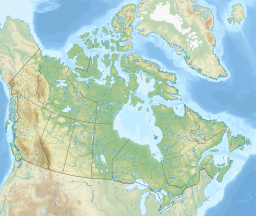Lost Echo Lake
| Lost Echo Lake | |
|---|---|
| Location | Narrow Hills Provincial Park, Saskatchewan |
| Coordinates | 54°08′00″N 104°45′01″W / 54.1334°N 104.7504°W |
| Primary inflows | Caribou Creek |
| Primary outflows | Caribou Creek |
| Basin countries | Canada |
| Surface area | 95.6 ha (236 acres) |
| Max. depth | 13.72 m (45.0 ft) |
| Shore length1 | 5.43 km (3.37 mi) |
| Surface elevation | 523 m (1,716 ft) |
| 1 Shore length is not a well-defined measure. | |
Lost Echo Lake[1] is a lake in the east-central part of the Canadian province of Saskatchewan in Narrow Hills Provincial Park.[2] It is situated in a glacier-formed valley in the Cub Hills[3] and the boreal forest[4] ecozone of Canada. It is south of Summit Lake and is accessed from secondary roads that branch off of Highway 913. While there are no communities nor settlements on the lake, there is the Lost Echo Wilderness Campsite on the western shore.[5]
Description[edit]
Lost Echo Lake is situated along the course of Caribou Creek[6] in a valley in the Cub Hills, south of Summit Lake and north of Upper Fishing Lake. From Lost Echo Lake, Caribou Creek carries on down the valley, passing through the lakes of Lower Echo Lake and Upper Fishing Lake and into Lower Fishing Lake. Lower Fishing lake is drained by Stewart Creek, which flows south into Torch River. Torch River flows east into the Saskatchewan River and is part of the Hudson Bay drainage basin. Inflows for the lake include waters flowing in from Summit Lake via Caribou Creek, and nearby hills and muskeg.[7][8]
Fish species[edit]
Fish commonly found in Lost Echo Lake include walleye, northern pike, and lake trout.[9][10] The lake's outflow was first stocked with brook trout in 1934. The creek is well suited for brook trout and as a result, the trout developed a sustainable, naturalised population.[11]
See also[edit]
References[edit]
- ^ Government of Canada, Natural Resources Canada. "Place names - Lost Echo Lake". www4.rncan.gc.ca.
- ^ "Narrow Hills Provincial Park". Tourism Saskatchewan. Saskatchewan Government.
- ^ Government of Canada, Natural Resources Canada. "Place names - Cub Hills". www4.rncan.gc.ca.
- ^ "Boreal Plains Ecozone". ecozones. Retrieved 22 February 2022.
- ^ "30 Free Places to Camp in Saskatchewan". explore-mag. Explore Magazine. Retrieved 22 February 2022.
- ^ Government of Canada, Natural Resources Canada. "Place names - Caribou Creek". www4.rncan.gc.ca.
- ^ "Lost Echo Lake Fishing Map". gps nautical charts. Bist LLC. Retrieved 22 February 2022.
- ^ "Lost Echo Lake, Saskatchewan Map". geodata.us. Geodata.us. Retrieved 22 February 2022.
- ^ "Fishing in Lost Echo Lake".
- ^ "Saskatchewan's Wonderland, Narrow Hills Provincial Park". 13 June 2021.
- ^ "Trout Streams of the Cub Hills". environment.gov.sk. Saskatchewan Ministry of Environment.


